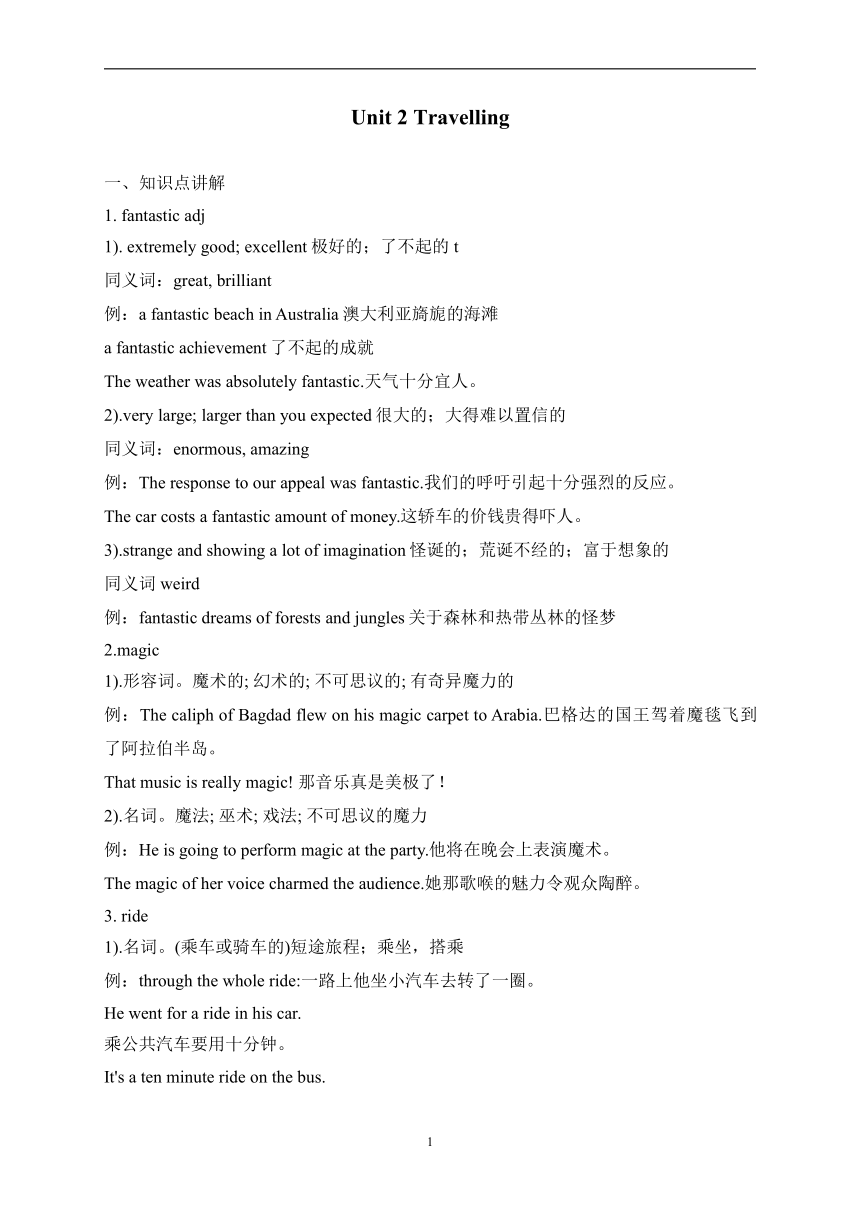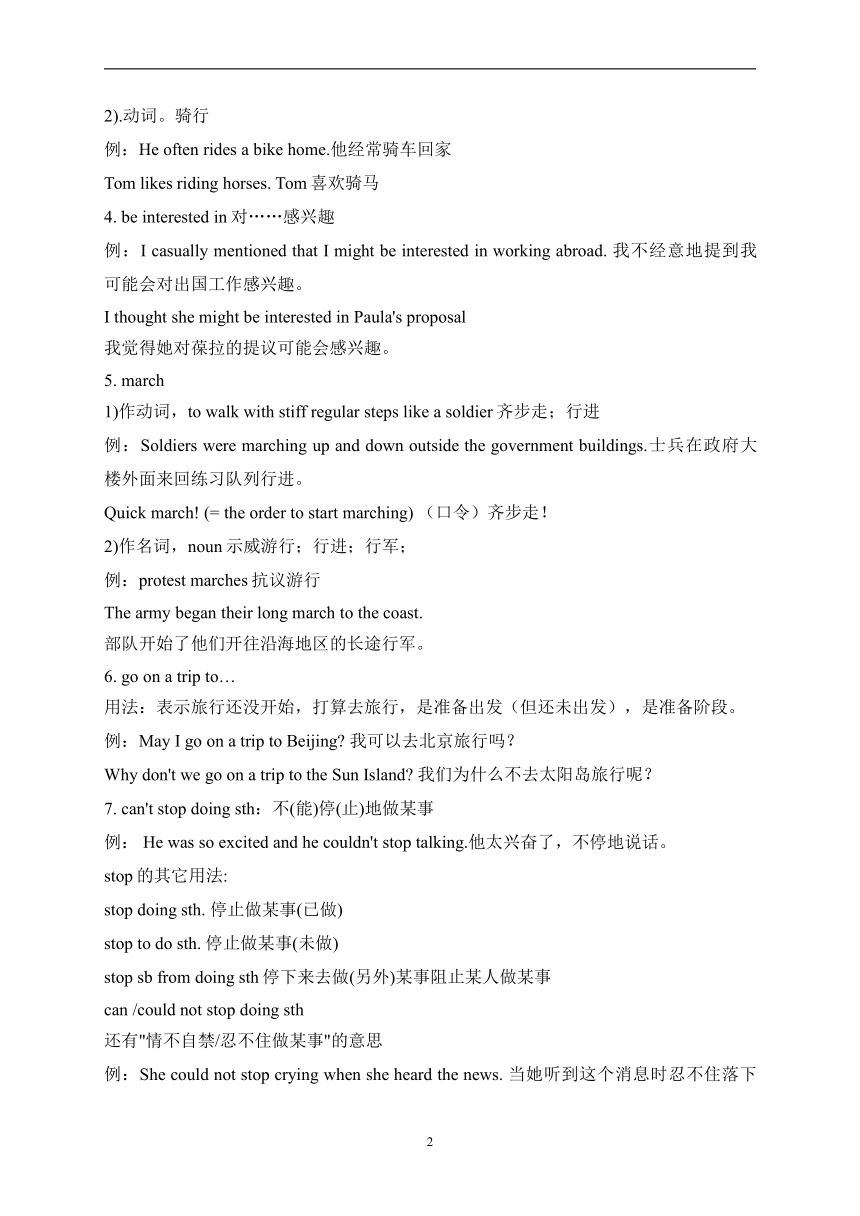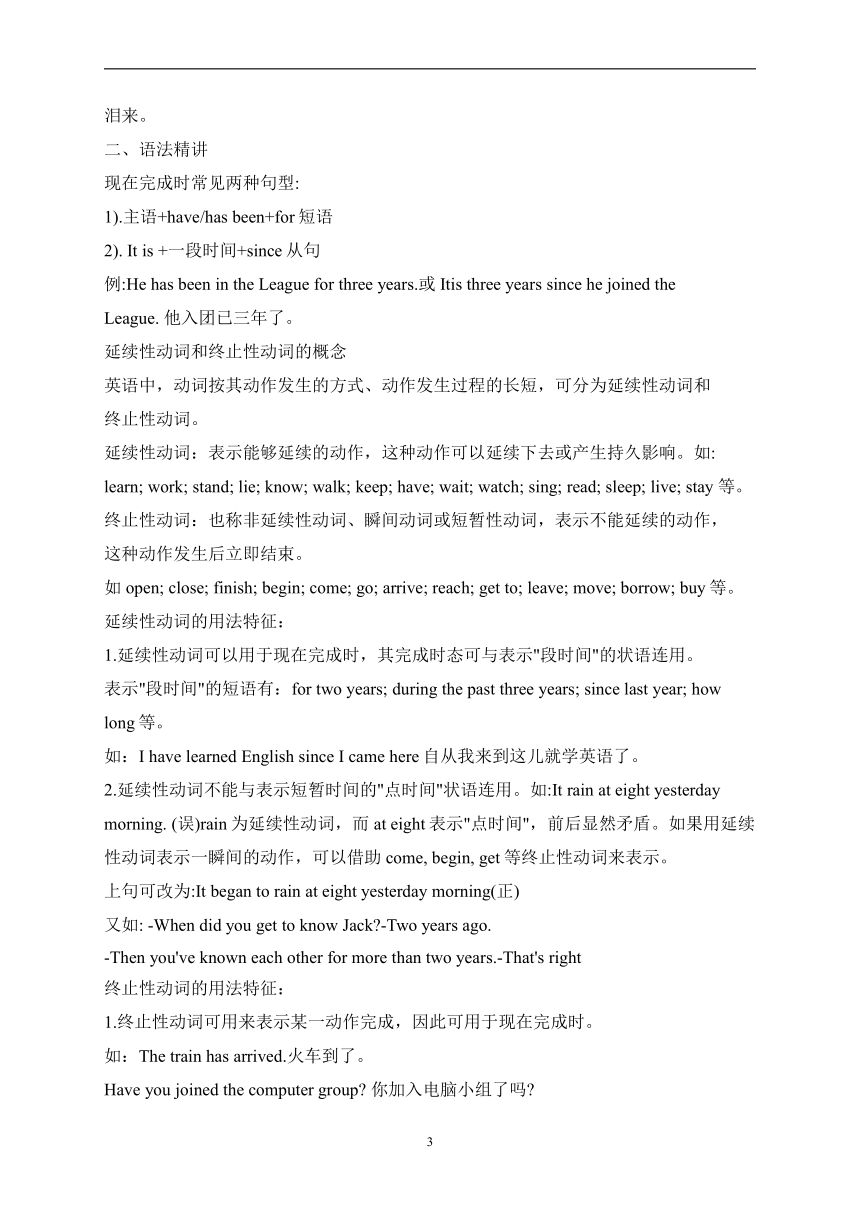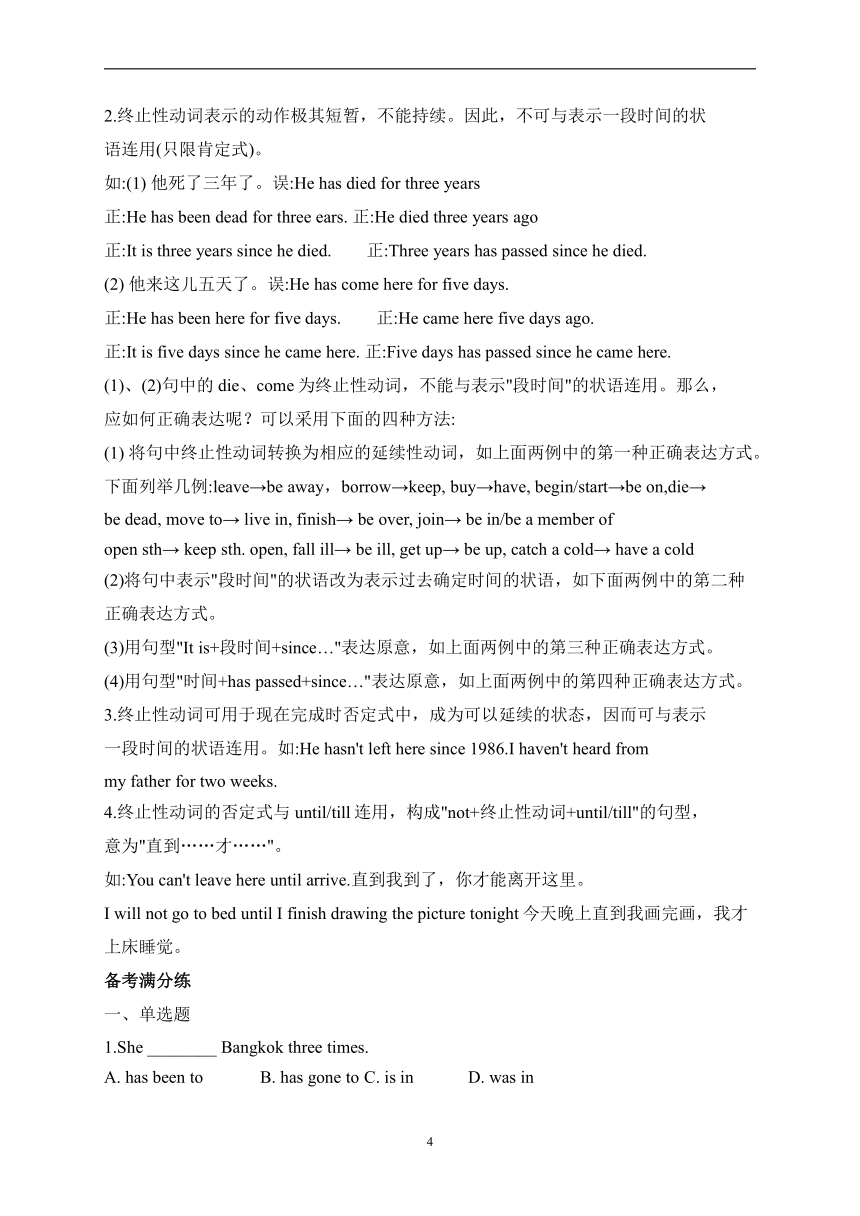Unit 2 Travelling——2022-2023学年牛津译林版英语八年级下学期期末复习备考攻略(含解析)
文档属性
| 名称 | Unit 2 Travelling——2022-2023学年牛津译林版英语八年级下学期期末复习备考攻略(含解析) |  | |
| 格式 | docx | ||
| 文件大小 | 30.5KB | ||
| 资源类型 | 教案 | ||
| 版本资源 | 牛津译林版 | ||
| 科目 | 英语 | ||
| 更新时间 | 2023-06-18 16:19:10 | ||
图片预览




文档简介
Unit 2 Travelling
一、知识点讲解
1. fantastic adj
1). extremely good; excellent极好的;了不起的t
同义词:great, brilliant
例:a fantastic beach in Australia澳大利亚旖旎的海滩
a fantastic achievement了不起的成就
The weather was absolutely fantastic.天气十分宜人。
2).very large; larger than you expected很大的;大得难以置信的
同义词:enormous, amazing
例:The response to our appeal was fantastic.我们的呼吁引起十分强烈的反应。
The car costs a fantastic amount of money.这轿车的价钱贵得吓人。
3).strange and showing a lot of imagination怪诞的;荒诞不经的;富于想象的
同义词weird
例:fantastic dreams of forests and jungles关于森林和热带丛林的怪梦
2.magic
1).形容词。魔术的; 幻术的; 不可思议的; 有奇异魔力的
例:The caliph of Bagdad flew on his magic carpet to Arabia.巴格达的国王驾着魔毯飞到了阿拉伯半岛。
That music is really magic! 那音乐真是美极了!
2).名词。魔法; 巫术; 戏法; 不可思议的魔力
例:He is going to perform magic at the party.他将在晚会上表演魔术。
The magic of her voice charmed the audience.她那歌喉的魅力令观众陶醉。
3. ride
1).名词。(乘车或骑车的)短途旅程;乘坐,搭乘
例:through the whole ride:一路上他坐小汽车去转了一圈。
He went for a ride in his car.
乘公共汽车要用十分钟。
It's a ten minute ride on the bus.
2).动词。骑行
例:He often rides a bike home.他经常骑车回家
Tom likes riding horses. Tom喜欢骑马
4. be interested in对……感兴趣
例:I casually mentioned that I might be interested in working abroad. 我不经意地提到我可能会对出国工作感兴趣。
I thought she might be interested in Paula's proposal
我觉得她对葆拉的提议可能会感兴趣。
5. march
1)作动词,to walk with stiff regular steps like a soldier齐步走;行进
例:Soldiers were marching up and down outside the government buildings.士兵在政府大楼外面来回练习队列行进。
Quick march! (= the order to start marching) (口令)齐步走!
2)作名词,noun示威游行;行进;行军;
例:protest marches抗议游行
The army began their long march to the coast.
部队开始了他们开往沿海地区的长途行军。
6. go on a trip to…
用法:表示旅行还没开始,打算去旅行,是准备出发(但还未出发),是准备阶段。
例:May I go on a trip to Beijing 我可以去北京旅行吗?
Why don't we go on a trip to the Sun Island 我们为什么不去太阳岛旅行呢?
7. can't stop doing sth:不(能)停(止)地做某事
例: He was so excited and he couldn't stop talking.他太兴奋了,不停地说话。
stop的其它用法:
stop doing sth. 停止做某事(已做)
stop to do sth. 停止做某事(未做)
stop sb from doing sth停下来去做(另外)某事阻止某人做某事
can /could not stop doing sth
还有"情不自禁/忍不住做某事"的意思
例:She could not stop crying when she heard the news. 当她听到这个消息时忍不住落下泪来。
二、语法精讲
现在完成时常见两种句型:
1).主语+have/has been+for短语
2). It is +一段时间+since从句
例:He has been in the League for three years.或Itis three years since he joined the
League. 他入团已三年了。
延续性动词和终止性动词的概念
英语中,动词按其动作发生的方式、动作发生过程的长短,可分为延续性动词和
终止性动词。
延续性动词:表示能够延续的动作,这种动作可以延续下去或产生持久影响。如:
learn; work; stand; lie; know; walk; keep; have; wait; watch; sing; read; sleep; live; stay 等。
终止性动词:也称非延续性动词、瞬间动词或短暂性动词,表示不能延续的动作,
这种动作发生后立即结束。
如open; close; finish; begin; come; go; arrive; reach; get to; leave; move; borrow; buy等。
延续性动词的用法特征:
1.延续性动词可以用于现在完成时,其完成时态可与表示"段时间"的状语连用。
表示"段时间"的短语有:for two years; during the past three years; since last year; how long等。
如:I have learned English since I came here自从我来到这儿就学英语了。
2.延续性动词不能与表示短暂时间的"点时间"状语连用。如:It rain at eight yesterday morning. (误)rain为延续性动词,而at eight表示"点时间",前后显然矛盾。如果用延续性动词表示一瞬间的动作,可以借助come, begin, get等终止性动词来表示。
上句可改为:It began to rain at eight yesterday morning(正)
又如: -When did you get to know Jack -Two years ago.
-Then you've known each other for more than two years.-That's right
终止性动词的用法特征:
1.终止性动词可用来表示某一动作完成,因此可用于现在完成时。
如:The train has arrived.火车到了。
Have you joined the computer group 你加入电脑小组了吗
2.终止性动词表示的动作极其短暂,不能持续。因此,不可与表示一段时间的状
语连用(只限肯定式)。
如:(1) 他死了三年了。误:He has died for three years
正:He has been dead for three ears. 正:He died three years ago
正:It is three years since he died. 正:Three years has passed since he died.
(2) 他来这儿五天了。误:He has come here for five days.
正:He has been here for five days. 正:He came here five days ago.
正:It is five days since he came here. 正:Five days has passed since he came here.
(1)、(2)句中的die、come为终止性动词,不能与表示"段时间"的状语连用。那么,
应如何正确表达呢?可以采用下面的四种方法:
(1) 将句中终止性动词转换为相应的延续性动词,如上面两例中的第一种正确表达方式。
下面列举几例:leave→be away,borrow→keep, buy→have, begin/start→be on,die→ be dead, move to→ live in, finish→ be over, join→ be in/be a member of
open sth→ keep sth. open, fall ill→ be ill, get up→ be up, catch a cold→ have a cold
(2)将句中表示"段时间"的状语改为表示过去确定时间的状语,如下面两例中的第二种正确表达方式。
(3)用句型"It is+段时间+since…"表达原意,如上面两例中的第三种正确表达方式。
(4)用句型"时间+has passed+since…"表达原意,如上面两例中的第四种正确表达方式。
3.终止性动词可用于现在完成时否定式中,成为可以延续的状态,因而可与表示
一段时间的状语连用。如:He hasn't left here since 1986.I haven't heard from my father for two weeks.
4.终止性动词的否定式与until/till连用,构成"not+终止性动词+until/till"的句型,
意为"直到……才……"。
如:You can't leave here until arrive.直到我到了,你才能离开这里。
I will not go to bed until I finish drawing the picture tonight今天晚上直到我画完画,我才上床睡觉。
备考满分练
一、单选题
1.She ________ Bangkok three times.
A. has been to B. has gone to C. is in D. was in
2.Alice isn't in the office. She ________ to the library.
A. went B. has been C. has gone
3.—Was the school trip interesting
—I thought it would be. But_________, it was very boring.
A. for example B. in fact C. of course D. such as
4.The ________ woman is afraid of ________.
A. death; dying B. dead; die C. dying; death D. died; dying
5.—Where is your father, Jenny
—He isn't at home. He ________ to Shanghai on business.
A. has been B. has gone C. went D. will go
6.They asked me ________ during the May Day holidays.
A. where had I gone B. where I had been C. where had I been D. where I had gone
7.The government _______ a new rule to stop young people playing video games for long. Nowadays many students spend less time online.
A. will make B.is making C. has made
8.—Where are the teachers now
—In the meeting room. They _____ the meeting for 10 minutes.
A. have begun B. have been on C. have had D. have been held
9.—Let's go to visit Jim's grandpa. I haven't seen him for a long time.
—You can't see him. He _____ for about two months.
A. was dead B. has been dead C. died D. had died
10.—I am going to spend my summer holiday in Hainan.
—How lucky you are! _____ And don't forget to email me.
A .Congratulations! B. Have a nice time!
C. Come on! D. Goodbye!
二、填空题
11.My reading _________(速度)has increased by practicing.
12.Everyone except Tom and Jack _____(be) to Beijing and Shanghai before.
13.The lovely little boy just can't stop _____(ask) some strange questions.
14."I _____ (fail) over and over again in my life and that is why I succeed," said Michael Jordan, a famous basketball player.
15.Lucy and Tom have been in love for many years and they'll get _____(marry) next month.
三、句型转换
16.The children arrived here at 9 o'clock.
The children _____ _____ here since 9 o'clock.
17.The girl began to learn English five years ago.
The girl_____ _____ English _____ five years.
18.She went to Beijing and hasn't returned yet.
She has_____ _____ Beijing.
19.Four years has passed since the students came to this school.
The students _____ _____ _____ this school for four years.
20.They got married twelve years ago.
They _____ _____ _____ since twelve years ago.
答案以及解析
1.答案:A
解析:考查现在完成时。句意:她去过曼谷三次。has been to去过(已回);has gone to去了(未回);be in在……里。根据“three times.”可知是指去过曼谷三次,应用has been to。故选A。
2.答案:C
解析:考查现在完成时。句意:爱丽丝不在办公室。她去图书馆了。went去,一般过去式;has been to去过某地(已回);has gone to去了某地(还没回来)。根据“Alice isn’t in the office.”可知,此处表示去了图书馆还没回来,用has gone to。故选C。
3.答案:B
解析:考查介词短语。句意:—学校旅行有趣吗?—我之前认为它是有趣的。但事实上,它很无聊。for example例如;in fact事实上,实际上;of course当然,自然;such as像……那种,诸如……之类。根据“I thought it would be. But..., it was very boring.”可知是,此处表示“实际上”,用以强调,与“我之前认为它是有趣的”这件事相反,故选B。
4.答案:C
解析:考查形容词辨析。句意:那个垂死的女人怕死。death名词,死亡;dying形容词,垂死的、临终的;die动词,死亡,过去式是died;dead形容词,死的。第一空后面名词是woman,因此填形容词dying,意为“垂死的女人”;第二空表示“害怕死亡”,of后跟名词。故选C。
5.答案:B
解析:考查现在完成时。句意:——詹妮,你爸爸呢?——他不在家。他去上海出差了。根据前文“He isn’t at home”,可知去了还没回来,应该用have/has gone to,故选B。
6.答案:B
解析:考查宾语从句。句意:他们问我五一假期期间我在哪里。在宾语从句中,主句为过去时,从句时态也为过去时,并且语序为陈述语气,排除选项AC。have gone表示去了还没有回来,根据“They asked me … during the May Day holidays.”,可知已经回来了,故选B。
7.答案:C
解析:考查动词时态。句意:政府制定了一项新规定,禁止年轻人长时间玩电子游戏。现在很多学生上网的时间少了。由句意可知,新规的制定对现在造成的影响是"学生上网的时间少了"。表示一个过去发生的动作对现在造成的影响,是现在完成时的基本用法。故选C。
8.答案:C
解析:考查短语搭配。句意: —老师们现在在哪儿 —在会议室里。他们已经开会十分钟了。短语"for 10 minutes" 必须与延续性动词连用, 因此排除 A、D; be on开始, 主语通常为电影、戏剧、会议等; 短语have the meeting"开会", 主语为人, 故选C。
9.答案:B
解析:考查现在完成时。句意: —我们去拜访吉姆的爷爷吧。我好久没见他了。—你看不见他了。他已经去世大约两个月了。根据"for about two months" 可知,要用现在完成时;含for引导的时间状语的句子的谓语动词应该用延续性动词, 这里用be dead表示。故选B。
10.答案:B
解析:根据首句句意"我打算去海南过暑假" 可知"Have a nice time!(祝你玩得愉快!)" 符合语境。
二、填空题
11.答案:speed
12.答案:has been
13.答案:asking
14.答案:have failed
15.答案:married
三、句型转换
16.答案:have; been
17.答案:has; learned; for
18.答案:gone; to
19.答案:have; been; in
20.答案:have; been; married
2
一、知识点讲解
1. fantastic adj
1). extremely good; excellent极好的;了不起的t
同义词:great, brilliant
例:a fantastic beach in Australia澳大利亚旖旎的海滩
a fantastic achievement了不起的成就
The weather was absolutely fantastic.天气十分宜人。
2).very large; larger than you expected很大的;大得难以置信的
同义词:enormous, amazing
例:The response to our appeal was fantastic.我们的呼吁引起十分强烈的反应。
The car costs a fantastic amount of money.这轿车的价钱贵得吓人。
3).strange and showing a lot of imagination怪诞的;荒诞不经的;富于想象的
同义词weird
例:fantastic dreams of forests and jungles关于森林和热带丛林的怪梦
2.magic
1).形容词。魔术的; 幻术的; 不可思议的; 有奇异魔力的
例:The caliph of Bagdad flew on his magic carpet to Arabia.巴格达的国王驾着魔毯飞到了阿拉伯半岛。
That music is really magic! 那音乐真是美极了!
2).名词。魔法; 巫术; 戏法; 不可思议的魔力
例:He is going to perform magic at the party.他将在晚会上表演魔术。
The magic of her voice charmed the audience.她那歌喉的魅力令观众陶醉。
3. ride
1).名词。(乘车或骑车的)短途旅程;乘坐,搭乘
例:through the whole ride:一路上他坐小汽车去转了一圈。
He went for a ride in his car.
乘公共汽车要用十分钟。
It's a ten minute ride on the bus.
2).动词。骑行
例:He often rides a bike home.他经常骑车回家
Tom likes riding horses. Tom喜欢骑马
4. be interested in对……感兴趣
例:I casually mentioned that I might be interested in working abroad. 我不经意地提到我可能会对出国工作感兴趣。
I thought she might be interested in Paula's proposal
我觉得她对葆拉的提议可能会感兴趣。
5. march
1)作动词,to walk with stiff regular steps like a soldier齐步走;行进
例:Soldiers were marching up and down outside the government buildings.士兵在政府大楼外面来回练习队列行进。
Quick march! (= the order to start marching) (口令)齐步走!
2)作名词,noun示威游行;行进;行军;
例:protest marches抗议游行
The army began their long march to the coast.
部队开始了他们开往沿海地区的长途行军。
6. go on a trip to…
用法:表示旅行还没开始,打算去旅行,是准备出发(但还未出发),是准备阶段。
例:May I go on a trip to Beijing 我可以去北京旅行吗?
Why don't we go on a trip to the Sun Island 我们为什么不去太阳岛旅行呢?
7. can't stop doing sth:不(能)停(止)地做某事
例: He was so excited and he couldn't stop talking.他太兴奋了,不停地说话。
stop的其它用法:
stop doing sth. 停止做某事(已做)
stop to do sth. 停止做某事(未做)
stop sb from doing sth停下来去做(另外)某事阻止某人做某事
can /could not stop doing sth
还有"情不自禁/忍不住做某事"的意思
例:She could not stop crying when she heard the news. 当她听到这个消息时忍不住落下泪来。
二、语法精讲
现在完成时常见两种句型:
1).主语+have/has been+for短语
2). It is +一段时间+since从句
例:He has been in the League for three years.或Itis three years since he joined the
League. 他入团已三年了。
延续性动词和终止性动词的概念
英语中,动词按其动作发生的方式、动作发生过程的长短,可分为延续性动词和
终止性动词。
延续性动词:表示能够延续的动作,这种动作可以延续下去或产生持久影响。如:
learn; work; stand; lie; know; walk; keep; have; wait; watch; sing; read; sleep; live; stay 等。
终止性动词:也称非延续性动词、瞬间动词或短暂性动词,表示不能延续的动作,
这种动作发生后立即结束。
如open; close; finish; begin; come; go; arrive; reach; get to; leave; move; borrow; buy等。
延续性动词的用法特征:
1.延续性动词可以用于现在完成时,其完成时态可与表示"段时间"的状语连用。
表示"段时间"的短语有:for two years; during the past three years; since last year; how long等。
如:I have learned English since I came here自从我来到这儿就学英语了。
2.延续性动词不能与表示短暂时间的"点时间"状语连用。如:It rain at eight yesterday morning. (误)rain为延续性动词,而at eight表示"点时间",前后显然矛盾。如果用延续性动词表示一瞬间的动作,可以借助come, begin, get等终止性动词来表示。
上句可改为:It began to rain at eight yesterday morning(正)
又如: -When did you get to know Jack -Two years ago.
-Then you've known each other for more than two years.-That's right
终止性动词的用法特征:
1.终止性动词可用来表示某一动作完成,因此可用于现在完成时。
如:The train has arrived.火车到了。
Have you joined the computer group 你加入电脑小组了吗
2.终止性动词表示的动作极其短暂,不能持续。因此,不可与表示一段时间的状
语连用(只限肯定式)。
如:(1) 他死了三年了。误:He has died for three years
正:He has been dead for three ears. 正:He died three years ago
正:It is three years since he died. 正:Three years has passed since he died.
(2) 他来这儿五天了。误:He has come here for five days.
正:He has been here for five days. 正:He came here five days ago.
正:It is five days since he came here. 正:Five days has passed since he came here.
(1)、(2)句中的die、come为终止性动词,不能与表示"段时间"的状语连用。那么,
应如何正确表达呢?可以采用下面的四种方法:
(1) 将句中终止性动词转换为相应的延续性动词,如上面两例中的第一种正确表达方式。
下面列举几例:leave→be away,borrow→keep, buy→have, begin/start→be on,die→ be dead, move to→ live in, finish→ be over, join→ be in/be a member of
open sth→ keep sth. open, fall ill→ be ill, get up→ be up, catch a cold→ have a cold
(2)将句中表示"段时间"的状语改为表示过去确定时间的状语,如下面两例中的第二种正确表达方式。
(3)用句型"It is+段时间+since…"表达原意,如上面两例中的第三种正确表达方式。
(4)用句型"时间+has passed+since…"表达原意,如上面两例中的第四种正确表达方式。
3.终止性动词可用于现在完成时否定式中,成为可以延续的状态,因而可与表示
一段时间的状语连用。如:He hasn't left here since 1986.I haven't heard from my father for two weeks.
4.终止性动词的否定式与until/till连用,构成"not+终止性动词+until/till"的句型,
意为"直到……才……"。
如:You can't leave here until arrive.直到我到了,你才能离开这里。
I will not go to bed until I finish drawing the picture tonight今天晚上直到我画完画,我才上床睡觉。
备考满分练
一、单选题
1.She ________ Bangkok three times.
A. has been to B. has gone to C. is in D. was in
2.Alice isn't in the office. She ________ to the library.
A. went B. has been C. has gone
3.—Was the school trip interesting
—I thought it would be. But_________, it was very boring.
A. for example B. in fact C. of course D. such as
4.The ________ woman is afraid of ________.
A. death; dying B. dead; die C. dying; death D. died; dying
5.—Where is your father, Jenny
—He isn't at home. He ________ to Shanghai on business.
A. has been B. has gone C. went D. will go
6.They asked me ________ during the May Day holidays.
A. where had I gone B. where I had been C. where had I been D. where I had gone
7.The government _______ a new rule to stop young people playing video games for long. Nowadays many students spend less time online.
A. will make B.is making C. has made
8.—Where are the teachers now
—In the meeting room. They _____ the meeting for 10 minutes.
A. have begun B. have been on C. have had D. have been held
9.—Let's go to visit Jim's grandpa. I haven't seen him for a long time.
—You can't see him. He _____ for about two months.
A. was dead B. has been dead C. died D. had died
10.—I am going to spend my summer holiday in Hainan.
—How lucky you are! _____ And don't forget to email me.
A .Congratulations! B. Have a nice time!
C. Come on! D. Goodbye!
二、填空题
11.My reading _________(速度)has increased by practicing.
12.Everyone except Tom and Jack _____(be) to Beijing and Shanghai before.
13.The lovely little boy just can't stop _____(ask) some strange questions.
14."I _____ (fail) over and over again in my life and that is why I succeed," said Michael Jordan, a famous basketball player.
15.Lucy and Tom have been in love for many years and they'll get _____(marry) next month.
三、句型转换
16.The children arrived here at 9 o'clock.
The children _____ _____ here since 9 o'clock.
17.The girl began to learn English five years ago.
The girl_____ _____ English _____ five years.
18.She went to Beijing and hasn't returned yet.
She has_____ _____ Beijing.
19.Four years has passed since the students came to this school.
The students _____ _____ _____ this school for four years.
20.They got married twelve years ago.
They _____ _____ _____ since twelve years ago.
答案以及解析
1.答案:A
解析:考查现在完成时。句意:她去过曼谷三次。has been to去过(已回);has gone to去了(未回);be in在……里。根据“three times.”可知是指去过曼谷三次,应用has been to。故选A。
2.答案:C
解析:考查现在完成时。句意:爱丽丝不在办公室。她去图书馆了。went去,一般过去式;has been to去过某地(已回);has gone to去了某地(还没回来)。根据“Alice isn’t in the office.”可知,此处表示去了图书馆还没回来,用has gone to。故选C。
3.答案:B
解析:考查介词短语。句意:—学校旅行有趣吗?—我之前认为它是有趣的。但事实上,它很无聊。for example例如;in fact事实上,实际上;of course当然,自然;such as像……那种,诸如……之类。根据“I thought it would be. But..., it was very boring.”可知是,此处表示“实际上”,用以强调,与“我之前认为它是有趣的”这件事相反,故选B。
4.答案:C
解析:考查形容词辨析。句意:那个垂死的女人怕死。death名词,死亡;dying形容词,垂死的、临终的;die动词,死亡,过去式是died;dead形容词,死的。第一空后面名词是woman,因此填形容词dying,意为“垂死的女人”;第二空表示“害怕死亡”,of后跟名词。故选C。
5.答案:B
解析:考查现在完成时。句意:——詹妮,你爸爸呢?——他不在家。他去上海出差了。根据前文“He isn’t at home”,可知去了还没回来,应该用have/has gone to,故选B。
6.答案:B
解析:考查宾语从句。句意:他们问我五一假期期间我在哪里。在宾语从句中,主句为过去时,从句时态也为过去时,并且语序为陈述语气,排除选项AC。have gone表示去了还没有回来,根据“They asked me … during the May Day holidays.”,可知已经回来了,故选B。
7.答案:C
解析:考查动词时态。句意:政府制定了一项新规定,禁止年轻人长时间玩电子游戏。现在很多学生上网的时间少了。由句意可知,新规的制定对现在造成的影响是"学生上网的时间少了"。表示一个过去发生的动作对现在造成的影响,是现在完成时的基本用法。故选C。
8.答案:C
解析:考查短语搭配。句意: —老师们现在在哪儿 —在会议室里。他们已经开会十分钟了。短语"for 10 minutes" 必须与延续性动词连用, 因此排除 A、D; be on开始, 主语通常为电影、戏剧、会议等; 短语have the meeting"开会", 主语为人, 故选C。
9.答案:B
解析:考查现在完成时。句意: —我们去拜访吉姆的爷爷吧。我好久没见他了。—你看不见他了。他已经去世大约两个月了。根据"for about two months" 可知,要用现在完成时;含for引导的时间状语的句子的谓语动词应该用延续性动词, 这里用be dead表示。故选B。
10.答案:B
解析:根据首句句意"我打算去海南过暑假" 可知"Have a nice time!(祝你玩得愉快!)" 符合语境。
二、填空题
11.答案:speed
12.答案:has been
13.答案:asking
14.答案:have failed
15.答案:married
三、句型转换
16.答案:have; been
17.答案:has; learned; for
18.答案:gone; to
19.答案:have; been; in
20.答案:have; been; married
2
同课章节目录
